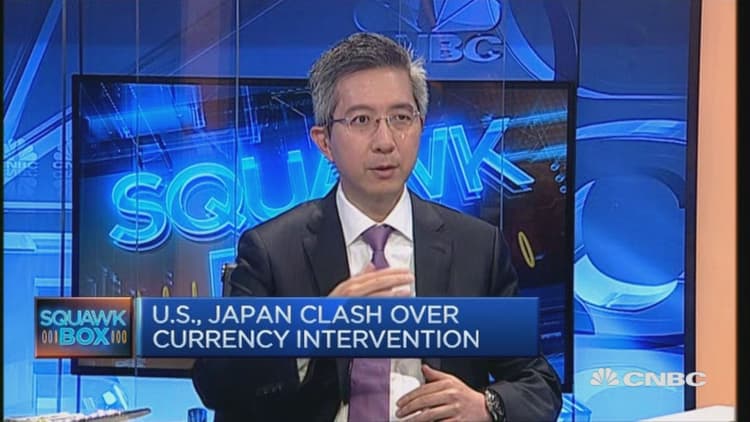
All of Japan's jawboning on the yen - and expectations the Bank of Japan (BOJ) will need to further ease policy - are unlikely to weaken the currency for long, JPMorgan Private Bank's Asia forex boss told CNBC.
Ben Sy, head of fixed income, foreign exchange and commodities for Asia at JPMorgan Private Bank, said Japanese companies and investors still had substantial offshore assets.
"When they see the yen weaken, they may use that as an opportunity to repatriate the earnings," Sy said - a move that would in turn likely cause the yen to strengthen.
Despite the Bank of Japan surprising markets on January 29 by introducing a negative interest rate policy, the yen has strengthened against the greenback, with the pair falling from levels over 120 in late January to as low as under 107, before recovering to trade around 110 early Monday.
That the yen strengthened despite the introduction of negative rates was "a big surprise to the market," Sy said. But he noted that the move was due to domestic buyers of the currency, particularly exporters, repatriating funds to Japan.
"They repatriated a lot of offshore earnings back to Japan. That results in strong buying of yen and that triggered short-covering of the yen positions," Sy said. "So the yen [went] from short to long, first driven by domestic and then followed by foreign investors."
He said he saw a short-term risk that the yen could weaken to as low as 112-113 heading into the next BOJ meeting in mid-June on expectations of more easing from the central bank, but that that weakening would likely prove short-lived.
"After that, the economy's fundamentals will drive the [dollar-yen] back to 103-105," he said.
Sy said negative rates had proved ineffective because there was a lack of confidence in Japan and Abenomics, as Prime Minister Shinzo Abe's plan to kickstart the economy is called.
"After they have tried for two years, the Japan economy continues to disappoint. So people doubt whether Japan's negative rates will help the economy," Sy said.
His comments followed tensions between Japan and the U.S. at the G-7 meeting of finance ministers in Sendai, Japan, over the weekend.
U.S. Treasury Secretary Jack Lew said his country considered the recent moves in the yen to be "orderly," giving Japan no justification to intervene in the currency, Reuters reported.
Lew's counterpart in Japan, Finance Minister Taro Aso said, however, that the moves had been disorderly and speculative, Reuters reported.
The G-20 countries agreed at a meeting in Shanghai in February that they would avoid competitive currency devaluations, but Japanese policymakers have argued that that agreement should not prevent intervention to stop the "rapid, one-sided" moves it had observed in the yen.
Follow CNBC International on Twitter and Facebook.
—By CNBC.Com's Leslie Shaffer; Follow her on Twitter @LeslieShaffer1




